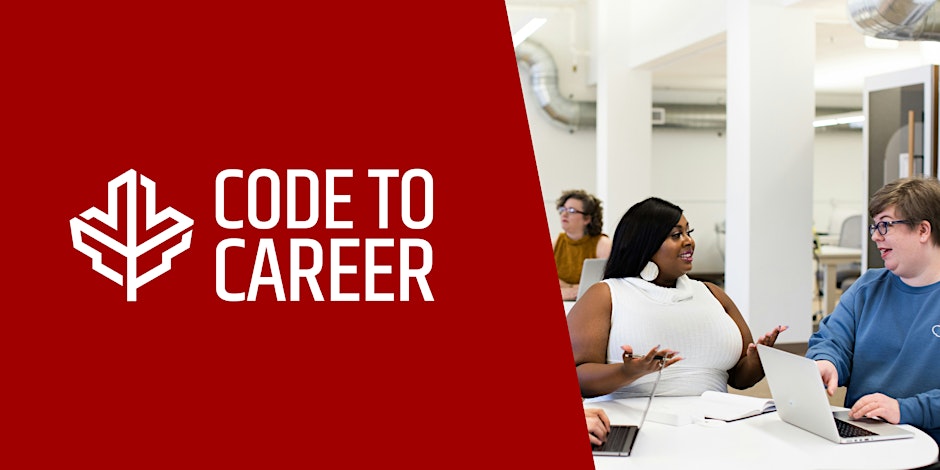Tips for How You Can Strengthen Your Application

Embarking on a new career journey can be both exciting and daunting, especially in the rapidly-evolving world of technology. If you’re considering applying to the Code to Career program, you might be wondering how to put your best foot forward and ensure your application stands out. In this blog post, we’ll share valuable tips to help you strengthen your application, ensuring that you not only make the right decision about applying but also clearly understand the process and effectively represent your candidacy.
To provide you with the most accurate and helpful information, we’ve also included a Q&A section that’s been developed alongside Erin Kjaer, our Adult Programs Manager. They’ll highlight key aspects of the application process, the resources available through Canada Learning Code to support you in submitting a strong application, as well as tips to consider on how you can make your application stand out.
Remember, while applying doesn’t guarantee entry, a well-prepared application can significantly enhance your chances of being accepted into the program. Let’s dive in and get you one step closer to achieving your career goals in tech.
Q&A with Erin Kjaer, Adult Program Manager at Canada Learning Code

From your experience talking to prospective students, delivering information sessions, and fielding questions about Code to Career across various platforms, what steps would you suggest prospective applicants take before they apply to the program?
I think before we even get to that, prospective applicants should take a second to celebrate a little. Whether Code to Career is the right path for you or not, you’ve started a journey towards upskilling and career development, which is a big deal!
After a little recognition and pat on the back for making that decision, next, I would encourage you to make sure that you’ve reviewed the information and FAQ on the Code to Career website so that you can get a sense of what the program is and who it’s for. I would also strongly recommend that anyone thinking about applying joins us for an Online Info Session.In these sessions, we go into much more detail about the program and walk you through the application process, step by step. It’s also your chance to ask questions to make sure that this program is actually the right one for you and your career goals.
Given your understanding of the application process, what are the key criteria in a strong Code to Career application?
This is a great question. I think first and foremost a strong application will demonstrate that you’ve taken the time to think about the program and are excited to see yourself as a part of the tech ecosystem. You should understand the role of a software engineer, and have an idea of what kind of roles you might be interested in pursuing as a graduate of the program. The admissions team wants to see that you’re committed and equipped to tackling the challenge of the 12-week intensive program and everything that comes afterwards!
What common mistakes have you seen applicants make time and time again, and how can those mistakes be avoided?
I would say that applicants should ensure they understand all of the criteria before completing the Eligibility Survey as part of their application. For example, I’ve seen applicants indicate that they don’t have the required work experience, when in reality they did not review the question and missed that their work experience from outside of Canada would be applicable! We discuss each of these criteria in depth during our Info Sessions, so this is a big part of why I recommend that applicants attend.
Next, I would encourage applicants to be sure that they understand how other services they’re receiving might impact their eligibility. For example, your eligibility for receiving EI Benefits while taking full time training varies between provinces and territories, so you should be sure to check with Service Canada to ensure that you meet the requirements and complete the necessary declaration. Be sure to double check these requirements and communicate with your Learning Advisor if you have any questions!
Part of our role in offering the Code to Career initiative is providing support to our community to help them put their “best foot forward”. Can you tell us a little bit about what resources Canada Learning Code offers to help applicants prepare their applications?
We want to make sure that you’re set up for success! One of the best ways to do that is to come and join us for one of our Intro to Software Engineering sessions. If you don’t have a background in programming or engineering, don’t have a basic understanding of common programming languages, or have no idea what to expect out of the intensity of a bootcamp, attending this session is a no-brainer.
This 3-hour workshop is both a primer on some of the foundational skills you’ll use in the program and a taste of what it’s like to take in new information and implement it in a hands-on and fast paced environment, which will be an essential part of your experience as a participant in the Software Engineering Bootcamp.!
You can also check out the Coding Bootcamp Prep Course from BrainStation. This free video course is designed to help you quickly learn the fundamentals of web development, and while not designed as a full introduction to Software Engineering, it will provide an overview of some foundational skills that can help to set you up for success. If you can, do both! This way you’ll be covering all your bases and be making decisions and crafting your application with so much more knowledge about what you’re getting into.
We’ve heard from a lot of prospective applicants who don’t have a traditional tech background, but who are interested in using Code to Career to kickstart a new career. What advice do you have for these individuals about key things to focus on (or not)?
We get inquiries from folks outside of tech a lot, and the answer is that while a background in tech is absolutely not a requirement, applicants should have some technical skills. When I say “technical skills” I don’t mean that you need to be a strong coder, but you should be comfortable using and learning about technology in your everyday life.
For those who are concerned about their lack of formal experience with technology, I would also say that the Intro to Software Engineering workshop is a must! During the workshop, I’d invite you to pay attention to how you feel and ask yourself—do the coding exercises feel like a fun puzzle, or like a mystery that you’re solving as you go? That’s a great sign! Are you feeling excited to learn each step and test out your new knowledge? That’s amazing. If you’re feeling frustrated, bored, or disengaged, that might be a sign that the subject matter isn’t the right fit for you and this program might not be your next step after all. Uncovering these important insights during the program consideration and application process is critical and it will be an indicator as to whether you’re a strong candidate for the program or not.
We hear a lot about technical skills versus soft skills. How important is it to demonstrate each to ensure that you’re showing the assessor the full picture of who you are and what skills you possess and bring to the program?
I love this question! I would say that technical skills (your comfort and ability to use technology) and “soft skills” are of equal importance.
The types of skills you likely use in your current job, or in your life, are going to continue to serve you both as a participant of the program and as a graduate. Your leadership skills, your approach to learning and problem solving, your critical thinking abilities, are all assets. I would recommend that you consider the ways that these and other skills you might have would help to support you both as a student in the program and in pursuit of a career in tech.
After someone officially submits their application to the program, what support is available to them throughout the application process? Or do they submit and sit tight and wait?
Once you begin the application process, our delivery partners at BrainStation will take great care of you. After reviewing your responses to the Eligibility Survey, a Learning Advisor from their team will reach out to select applicants to walk you through the next steps, answer any questions that you have about the program, and help you to understand whether the Software Engineering Bootcamp is right for you. You’ll receive more information about the interview and technical challenge.
If an applicant isn’t accepted, what feedback or resources can they expect to help improve their chances for future applications?
As I shared earlier, our colleagues at BrainStation manage the admissions and facilitation of the software engineering bootcamp. Due to the high number of applicants, their admissions team does not provide individual feedback to applicants, which is in line with most high volume application processes. If you weren’t accepted, don’t be discouraged—the application process is as much about selecting qualified candidates as it is setting you up for success. To build from this experience, I’d recommend thinking about the process and technical challenge and identifying any points of difficulty, so that you have an idea of which skills to focus on as you explore your next steps.
That being said, my colleagues and I here at Canada Learning Code would be more than happy to talk more about what other pathways might be available to you through our other programs! Check out our offerings or shoot us a message, we’d love to connect.
What follow-up steps should applicants take after submitting their application?
After submitting your “get started” form on the Code to Career website, you’ll receive information about how you can follow up with questions during the next part of the process. Qualified applicants will hear back from a BrainStation Learning Advisor within 2 weeks after submitting the form, and that individual will be able to guide you through next steps.
While you wait, I would recommend that you browse LinkedIn,check out some of the really cool capstone projects students work on to get a sense of what’s in store for you, uncover your potential future industry considerations, and think about what makes you excited to enter the world of Software Engineering.
What’s your next step?
Thank you, Erin, for taking the time to provide such in-depth answers to some of the most common challenges and questions we’ve been hearing from prospective applicants and current students who have gone through the application process.
Considering all of Erin’s above advice, make sure you pick the next step that’s right for you at this point in your journey and good luck on kick starting your career in Software Engineering!
Are you a prospective applicant and need more information through one of our information sessions or workshops to make the right choice? Register today to set that ball in motion.
Or have you attended an information session and/or completed the workshop and now you’re ready to start the process and fill out the “Get Started” form?

Other Great Reads
-
The end of this chapter, the start of a new one
Over 10 years ago, we ran our first chapter-led workshop in Vancouver, BC. In 2024, we ran our last one, on the other side of the country, in St. John...
-
NEWS RELEASE: Canada Learning Code and BrainStation promote ongoing subsidized tech skills bootcamp at a community forum in Toronto, ON
Canada Learning Code and BrainStation promote ongoing subsidized tech skills bootcamp at a community forum in Toronto, ON For Immediate Release TORO...
-
NEWS RELEASE: Canada Learning Code and BrainStation promote ongoing subsidized tech skills bootcamp at a community forum in Vancouver, BC
Canada Learning Code and BrainStation promote ongoing subsidized tech skills bootcamp at a community forum in Vancouver, BC For Immediate Release VA...
